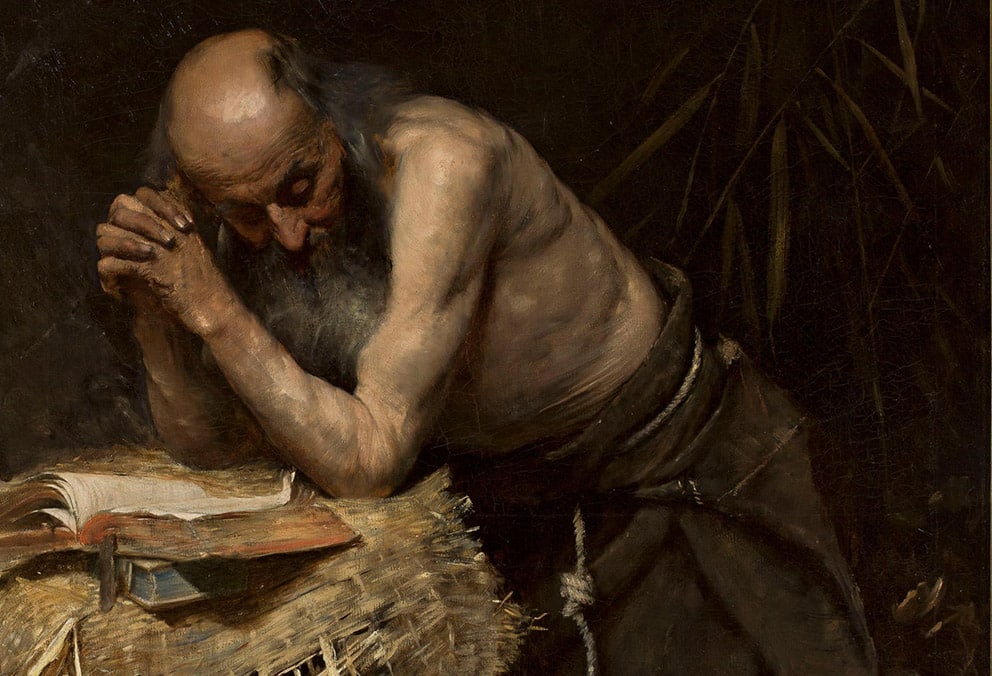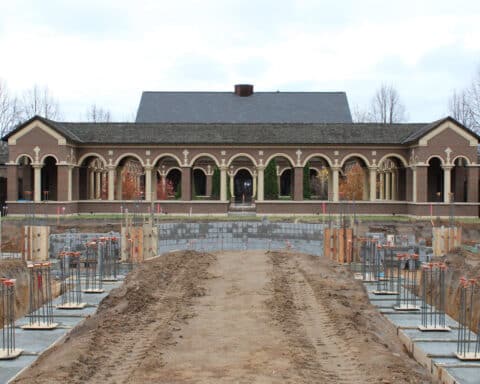With all the recent closures of public venues there is a word you may be hearing a lot: unprecedented. While this is an unprecedented pandemic involving unprecedented measures to ensure everyone’s safety, giving many of us an unprecedented stay-cation, the truth is that nothing is unprecedented in the life of the Church. With restrictions on worship, it is easy to feel lost in the spiritual life and unsure of how to grow closer to God while not leaving the house. Fortunately, the Church offers models for us in her saints, especially in saints who lived an eremitic lifestyle.
What is eremite? It’s not a whitish weasel (that’s an ermine), but another name for a hermit, someone who withdraws from the world to dedicate him or herself to penance and prayer. We have many biblical examples of hermits, such as John the Baptist and Elijah, and early saints, such as St. Anthony of Egypt, who lived in the desert to hear God’s voice. Some lived in caves or huts; some, such as St. Simeon Stylites, lived on top of pillars; others, like Julian of Norwich, lived in single rooms built on to a parish church.
The members of this last group were called anchorites, because on entering the room, the anchorite (or the anchoress, for a woman) made a promise of stability, to remain anchored to that place. Maybe that sounds familiar with all the restrictions imposed by the crisis. One priest wrote a rule for anchoresses in medieval England, called Ancrene Riwle. While not all parts of the rule may be helpful for us staying home today, there are some tips we can learn from how these holy women lived. Here’s your guide to being a modern day anchorite during the coronavirus pandemic.
| A saintly companion |
|---|
 St. Simeon Stylites (390-459) was known for being a little extreme. He originally entered a monastery, but his fellow monks thought that his penances were too hard for their way of life. He then spent three years in a hut before moving his hermitage to a platform atop a 59-foot pillar. Talk about social distancing! People used to gather at the foot of his pillar to seek his advice and listen to his preaching. He also wrote letters to various people, offering his prayers and guidance.
Prayer: St. Simeon Stylites, you sought God atop a pillar separated from the world. Help me in this time of isolation to turn ever more to God and trust that he will show me the way in these uncertain times. Amen. Source: OSV’s Encyclopedia of Saints |
1. Set a schedule
One of the most difficult aspects of the pandemic is the uncertainty and the change it brings to daily life. While we may not know when these changes will end, one way to combat uncertainty is to establish a daily routine for work or school and time for prayer. The Riwle provides a rigorous regimen of prayers throughout the day, from getting dressed in the morning, to midafternoon and falling asleep at night. While you may not be able to pray as frequently as an anchorite, decide when and how you are going to offer your day to God. You might use the time at home to try a new prayer practice, such as journaling or lectio divina.
2. Keep the cow outside
One of the directions in the Riwle says that if the anchoress keeps animals, with the exception of a cat, she should keep them outside of her enclosed room. We know based on human experience that if there is a rule not to do it, then it was probably done at some point. In any case, care for whatever animals you have, and take care what distractions you let into your place of prayer. Setting phones to silent during prayer time (or to a moo ringtone) reminds us to keep distractions and cows out of the place set aside for God.
3. Plenty of windows
Part of the rule we have for these anchoresses describes how their room should be set up and makes provision for plenty of windows to let in sunlight, to see into the neighboring church to observe the Mass and to converse with people who come to ask advice. While remodeling your abode is probably not an option, the purpose of the anchoress’ windows is something to live out. Make sure you have access to sunlight, which is necessary for vitamin D, and use the window of your screen to view Mass and adoration remotely and chat with friends who may be struggling with being alone.
4. Focus on your five senses
While we are practicing social distancing, it is good to remember the gifts we have in our body and thank God for our five senses. Think about how your senses can lead you closer to God, or how you might be tempted through them. Do you have images of Christ to remind you of his love, or do you scroll through endless social media posts, wishing you were somewhere else? Do you listen to music and podcasts that remind you of God’s goodness, or that lead you to fear? During Lent, think about what Christ experienced through his senses during the Passion: the tears that filled his eyes, the shouts of the crowd, the taste of dirt in his mouth when he fell under the weight of the cross. How can you use your senses for his glory?
5. Fasting
When we are already foregoing so many basic human interactions, it sounds odd to add fasting to the list. Aren’t we giving up enough already? These holy hermits knew that fasting detaches us from the things of the world and increases our desire for the things of heaven. Fasting could be as simple as watching one less Netflix episode and taking that time to read a Scripture passage instead.
6. Notice nature
Whether you live closer to bears than to people or in an apartment complex far above the ground, take advantage of this time away from normal activities to see the beauty of the natural world. The Riwle notes that by observing nature we can learn about God’s care for us and how our souls should rely on him. Birds direct their flight upwards in the sky, just as we should direct our thoughts to God, especially in these uncertain times. A bird with its wings spread forms a cross to remind us that we share in Christ’s cross through our sufferings. What beauties of nature do you notice, and how might you see reminders of God in them?
7. Read
The Riwle says, “Reading is good prayer. Reading teacheth how and for what we ought to pray.” Take this opportunity to learn more about the Faith, both individually and as a family. Words for prayer may not come easily, but the Book of Psalms contains many passages that might fit what you are feeling. Look for an accessible Bible study, or use one of your questions about the Faith as a way to search for your next book. For family read-alouds, the lives of the saints make for great stories to suit everyone’s interest.
8. Take a patron saint
Picking a patron saint for staying home from work or school may sound strange, but it’s based on the practice of these anchoritic women. When a woman entered her room, she took the name of the church where she lived to show her dedication to God. While you don’t need to give up your name because of the coronavirus, picking a patron saint (maybe an anchorite or hermit) increases our heavenly friendships and provides extra prayers for the days ahead.
9. Hobbies of service
Picking up hobbies is not new, but women in anchoritic holds help us to think about it differently. They made clothes that could be given to the needy or gave their food to the poor who came to their door. Get creative and try learning a new skill to help out the less fortunate. There are charities with instructions on how to make shoes, clothes and other items for children in need out of common household objects.
However you decide to spend your time at home, know that you are not alone in your spiritual journey and there are many saints who have grown close to God within the four corners of a single room.
Amy Marter is an alumna of Christendom College and a graduate student at The Catholic University of America.
| Quotes from Ancrene Wisse |
|---|
|
“You should look into yourself and see what sins of your own are yet to amend. You should sometimes consider the pain of hell, that you may abhor them, and flee the more resolutely from them. You should look, in spirit, to the blessedness of heaven, in order to kindle in your heart the desire to hasten thither.” — No. 63
“The remedy for indolence is spiritual joy, and the consolation of joyful hope from reading and from holy meditation, or when spoken by the mouth of man. Often, dear sisters, you ought to pray less, that you may read more. Reading is good prayer. Reading teacheth how, and for what, we ought to pray; and prayer afterwards obtaineth it. In reading, when the heart feels delight, devotion ariseth, and that is worth many prayers.” — No. 169 “What is a pure heart? I have told you before: it is that you neither desire nor love any thing but God only, and those things, for God, that assist you to come to him.” — No. 208 |





